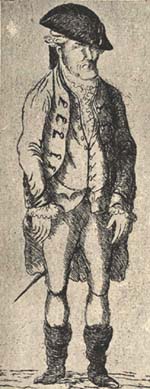
"As I have no reason to doubt your caution and discretion in not caling for troops till they are wanted, so on the other hand, I hope you will not delay a moment calling for their aid and making use of them effectually where there is occasion. That occasion always presents itself when the civil power is trifled with and insulted, nor can a military force ever be employed to a more constitutional purpose than in support of the authority and dignity of magistracy"
-Letter from Lord Waymouth, Secretary of State, urging magistrate Ponton to use force to quell the growing London mob (Scouller 179)
It's March, 1768. You've been stationed outside of the King's Bench Prison in London, where John Wilkes is being held. Wilkes had caused several disturbances in London five years ago by denouncing King George the III, and later printed an obscene parody of Pope's Essay on Man which had prompted charges of blasphemy. He was wildly popular when he left the country, the phrase "Wilkes and Liberty" becoming almost a rallying cry for disgruntled laborors, and his return in February had been met with a lot of public enthusiasm. (Stevenson 65).

John Wilkes, Caricature by James Sayers
In fact, just six weeks ago, after Wilkes won a seat in the Middlesex County elections, an mob tore through the streets of London breaking windows not lit up in his honor. Of course, you think that a lot of the civil disorder has as much to do with Wilkes as it does the poor harvests of the past two years and the high food prices that resulted, but the weavers' riots and other sporadic outbursts are being blamed on him nonetheless. Your regiment has been called in largely to try to calm down the angry mobs that have been rallying in his support.
You and your fellow soldiers are lined in two long rows in order to cover as much of the front of the prison as possible. There has been stone throwing all morning, and one of the magistrates, Daniel Ponton, has come out to read the Riot Act proclamation to the crowd.
Throughout the reading, you notice that one young protester has been
particularly insulting, and a Scotsman friend of yours invites you to
pursue and arrest the fellow. You decline and try to convince your friend
to ignore the man. Considering Wilkes's public opposition to the Scots,
you tell your friend, it's only going to cause more trouble if the chase
calls attention to the fact that most of the guarding regiment consists
of Scotsmen. (Hayter 179)
Your friend ignores you, and he and two other Scottish soldiers begin
the chase. You lose sight of them, but a little while later you hear shouts
and a gunshot. The mob is starting to get unruly again, and it's hard
to pay attention to what everyone is yelling about, but eventually your
friend returns to his place next to you in the line. We shot the wrong
guy, he tells you. The mob is beginning to get out of control.
At about 1:00, you see Samuel Gillam, a justice under Ponton, approach the crowd. He asks them to disperse, and reminds them that the Riot Act has been read and they were all likely to be arrested. The mob angrily voices doubt at this charge, and Gillam reads the Riot Act again. When he notices that he has had no effect on the crowd, he remarks in frustration that if they don't disperse he will call on the guards to fire. This comment is met with a shower of stones, one of which strikes Gillam directly in the head and he is knocked back a few feet. Angrily, Gillam gives the order to fire.
You and your regiment rearrange into four rows, and begin to fire two rows at a time. You fire into the air, according to procedure, and beside you some of your friends are hit by stones hurled from the crowd.
There are several deaths and many wounded, and the incident is quickly dubbed "The Massacre of St. George's Fields." Though some in the army, you hear, argue that the tactic of firing into the crowd is effective and should be adopted, the public outcry that followed causes the army to abandon this strategy. (Stevenson 68)
A couple weeks later, you find you and your regiment are being sent to the American colonies due to growing unrest. When you get there, you decide to go out and cheer yourself up a litte.
Next: Leisure Time